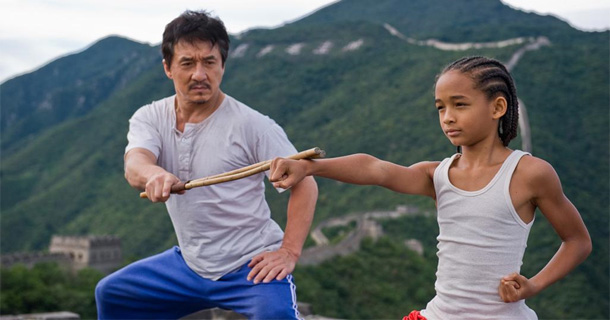Director Harald Zwart certainly takes his time in laying the groundwork. The film itself is a lengthy 140 minutes. Dre’s mentoring by Chan’s Mr Han only begins properly about an hour into the film, with a new variation on “wax on, wax off”. Even once that begins, though, there’s little emphasis on the martial arts stuff, barring a couple of picture-postcard montages. Zwart instead focuses on the relationship between the two, Mr Han coming to take the place of Dre’s absent father, alongside Dre’s school and language barrier troubles. It’s involving with a nicely judged tone – just serious enough, without neglecting some moments of humour (especially where Chan is involved). However, it does feel like it takes rather too long to get to where it’s going; this is the sort of film that really should have a 2-hour maximum length. There’s some depth and character development, but not enough plot complexity to justify anything longer, especially a story as predictable as this.
At times it just feels padded, often with touristy shots of China that look like they’re paid for by the national tourist board. China is mostly shown in a ridiculously idyllic light, which slightly robs the film of a certain realism and grittiness that it may have benefited from. And yes, it’s yet another one of those Hollywood films set in China that absolutely must feature the Great Wall, despite its inclusion being inexplicable. As an advert for the country, though, it’s certainly a pretty effective one: it looks stunning, and the setting really works for the story. Unfortunately, it renders the title nonsensical: karate is a Japanese martial art; Dre is actually taught kung fu in the film (and he even admonishes his mother in the film for calling it karate). Would The Kung Fu Kid have been such a bad title?

Release Information
Country: UK / Region: Free / Version: N/A / Discs: 1 / Distributor: Sony
Presentation
Karate Kid has the ultra-saturated, high-contrast look of some modern movies, which doesn't make for a particularly natural looking image but it is certainly striking, giving your TV a workout. Sharpness and detail are both at the very high end. Sony, as you would expect, know how to give an effective HD presentation. Not a whole lot to say on the sound side of the equation - as good as you would expect from Blu-ray audio.
Extras
A functional if unexceptional array of extras includes a few featurettes, a production diary, an alternate ending (Jackie Chan gets a bit of an action scene, which is fun, but it is superfluous so was rightly cut), and an interactive map of China, from which you can watch behind the scenes footage at each principal location. The Wu Dang Mountains are particularly stunning.

Summary
An enjoyable, well-made but wholly predictable and overlong underdog tale, The Karate Kid - dodgy title and all – is worth a watch, mainly for Jackie Chan in a fairly low-key role and Jaden Smith moving further along the road to stardom.













